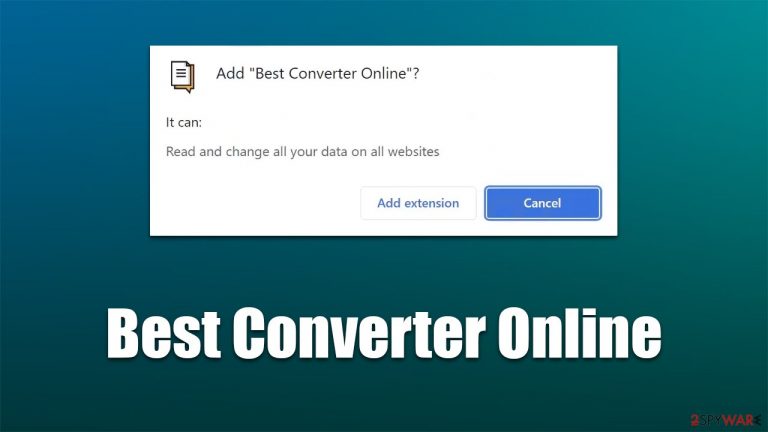Best Converter Online browser extension (Free Instructions)
Best Converter Online browser extension Removal Guide
What is Best Converter Online browser extension?
Best Converter Online promises to convert your files but inserts ads into your web browser

Best Converter Online is a potentially unwanted application[1] that is presented as a useful tool for file conversion purposes. While users might install it intentionally precisely due to this functionality, some might find the extension installed on their Google Chrome, Mozilla Firefox, MS Edge, or another web browser without giving it permission to do so. This can be easily explained by the distribution method known as software bundling,[2] where several components are compiled into a standalone installer, and users unintentionally install the whole package instead of the desired program.
One of the main reasons why Best Converter Online is placed in the category of adware is because of its deceptive operation post-installation. To be more precise, adware operates with the sole purpose of exposing users to pop-ups, coupons, offers, deals, and other types of ads on a regular basis – the primary function, as such, remains the secondary objective. This is why so many adware apps have very limited or even useless features.
To make matters worse, adware is commonly associated with insecure advertising networks, which results in users being exposed to all sorts of misleading and potentially dangerous material. For example, they might encounter a pop-up message saying that they need to update their browser to view some content, only to make users download and install malicious software on their devices.
Therefore, we strongly recommend not interacting with Best Converter Online ads in any capacity and removing the extension responsible for this behavior. Below we explain the process in detail, and we also provide some security tips that would reduce the probability of being infected in the future.
| Name | Best Converter Online |
|---|---|
| Type | Adware, potentially unwanted extension |
| Distribution | Software bundles, ads, deceptive websites |
| Symptoms | Installed unknown browser extension or application; intrusive deals, coupons, discounts, offers, and other advertisements; possible homepage and new tab address changes; redirects to ad-filled, scam, phishing, and other dangerous websites |
| Risks | Installation of other potentially unwanted programs/malware, personal data disclosure to unknown parties, monetary loss |
| Elimination | Get rid of the potentially unwanted app via browser settings by following our guide below. Scanning the device with SpyHunter 5Combo Cleaner security software can also be beneficial to ensure that no malicious software is present on the device |
| Tips | After you eliminate all PUPs from your system, make sure you clean your web browsers and repair system files. You can do that automatically with FortectIntego or refer to our manual guide |
File conversion is just a disguise
Adware is generally not considered to be as dangerous as ransomware or RATs,[3] for example, but it shouldn't be dismissed as harmless either. The category has a long history, as it also used to be referred to as spyware before due to its extensive data tracking as well as persistence capabilities. In fact, most adware that delivers intrusive ad campaigns is considered malicious in the first place.
Over time, ad-supported software had to tone down its malicious traits in order not to be detected by all security vendors and other relevant parties. As a result, adware is more subtle nowadays and usually comes as a browser extension that promises some type of seemingly useful features, such as file converting, for example.

In reality, most of the promised features are usually not what users expected; they either don't work at all or are very obscure. Browser hijackers are well known to use the “improved search” or “fast search” tropes, but they actually convey nothing more than ads in search results. Adware does the same thing, just usually without changing the browser's homepage or new tab function.
Removal steps
Step 1. Get rid of the browser extension
The first step to get rid of the unwanted redirects, ads, and other disruptive browser behavior is to uninstall the Best Converter Online extension. Usually, this poses no difficulties to users, although if you have not done this before (for example, you have no idea where the app came from in the first place), then refer to the instructions as follows.
Google Chrome
- Open Google Chrome, click on the Menu (three vertical dots at the top-right corner) and select More tools > Extensions.
- In the newly opened window, you will see all the installed extensions. Uninstall all the suspicious plugins that might be related to the unwanted program by clicking Remove.

Mozilla Firefox
- Open Mozilla Firefox browser and click on the Menu (three horizontal lines at the top-right of the window).
- Select Add-ons.
- In here, select unwanted plugin and click Remove.

MS Edge
- Open Edge and click select Settings > Extensions.
- Delete unwanted extensions by clicking Remove.

MS Edge (legacy)
- Select Menu (three horizontal dots at the top-right of the browser window) and pick Extensions.
- From the list, pick the extension and click on the Gear icon.
- Click on Uninstall at the bottom.

Safari
- Click Safari > Preferences…
- In the new window, pick Extensions.
- Select the unwanted extension and select Uninstall.

Step 2. Check for install programs
While the unwanted browser redirects and ads are likely to be caused by the Best Converter Online extension, there could be additional apps involved. Some of them can be installed on the system level, which would increase the scope of the operations. This would usually result in more aggressive forms of advertisements, such as pop-up windows showing up outside of the browser's active time.
Keep in mind that adware could be named as anything. Naturally, it could be titled similarly as the extension if such an app is installed. Unrelated PUPs might be disguised as media players, ad-blockers, or even fake security software.
Windows
- Enter Control Panel into Windows search box and hit Enter or click on the search result.
- Under Programs, select Uninstall a program.

- From the list, find the entry of the suspicious program.
- Right-click on the application and select Uninstall.
- If User Account Control shows up, click Yes.
- Wait till the uninstallation process is complete and click OK.

Mac
- From the menu bar, select Go > Applications.
- In the Applications folder, look for all related entries.
- Click on the app and drag it to Trash (or right-click and pick Move to Trash)

To fully remove an unwanted app, you need to access Application Support, LaunchAgents, and LaunchDaemons folders and delete relevant files:
- Select Go > Go to Folder.
- Enter /Library/Application Support and click Go or press Enter.
- In the Application Support folder, look for any dubious entries and then delete them.
- Now enter /Library/LaunchAgents and /Library/LaunchDaemons folders the same way and terminate all the related .plist files.

Step 3. Scan with anti-malware
While minor infections can be eliminated through browser settings, more serious malware will often have no windows or active services. They may also create new scheduled tasks and registry entries to evade detection – making it difficult for regular computer users to remove this type of virus manually. The possibility of additional serious infections is low, although never a zero.
Additionally, if you have discovered a potentially unwanted application of your system without installing it intentionally, there could be other PUPs present as well. The easiest way to check your system for most dangerous infections is to scan it with powerful security software, such as SpyHunter 5Combo Cleaner or Malwarebytes.
Step 4. Get rid of leftover files
Removing all potentially unwanted programs and scanning the system with anti-malware is really important, regardless of which type of infection you are dealing with. However, it is also important to make sure that all the leftover files are removed as well, and damage to the system is repaired.
For example, cookies, web beacons, and other tracking technologies are used to track user data regularly. By doing so, the developers of PUPs can exchange information with third parties, which brings additional financial gains. Targeted advertising is one of the most lucrative marketing techniques, as it makes users more likely to buy things they are interested in. Unfortunately, this can sometimes come with unsafe ads, depending on which party serves them. Adware-created advertisements can't be trusted due to insecure advertisement networks typically used by it.
In order to stop data tracking, we recommend removing browser caches, as we explain below. This can also be done with the FortectIntego PC maintenance tool, which can clean the leftover files automatically and also repair damaged system components to prevent crashes, errors, and similar issues that could arise under various circumstances.
Google Chrome
- Click on Menu and pick Settings.
- Under Privacy and security, select Clear browsing data.
- Select Browsing history, Cookies and other site data, as well as Cached images and files.
- Click Clear data.

Mozilla Firefox
- Click Menu and pick Options.
- Go to Privacy & Security section.
- Scroll down to locate Cookies and Site Data.
- Click on Clear Data…
- Select Cookies and Site Data, as well as Cached Web Content and press Clear.

MS Edge
- Click on Menu and go to Settings.
- Select Privacy and services.
- Under Clear browsing data, pick Choose what to clear.
- Under Time range, pick All time.
- Select Clear now.

MS Edge (legacy)
- Click on the Menu (three horizontal dots at the top-right of the browser window) and select Privacy & security.
- Under Clear browsing data, pick Choose what to clear.
- Select everything (apart from passwords, although you might want to include Media licenses as well, if applicable) and click on Clear.

Safari
- Click Safari > Clear History…
- From the drop-down menu under Clear, pick all history.
- Confirm with Clear History.

How to prevent from getting adware
Access your website securely from any location
When you work on the domain, site, blog, or different project that requires constant management, content creation, or coding, you may need to connect to the server and content management service more often. The best solution for creating a tighter network could be a dedicated/fixed IP address.
If you make your IP address static and set to your device, you can connect to the CMS from any location and do not create any additional issues for the server or network manager that needs to monitor connections and activities. VPN software providers like Private Internet Access can help you with such settings and offer the option to control the online reputation and manage projects easily from any part of the world.
Recover files after data-affecting malware attacks
While much of the data can be accidentally deleted due to various reasons, malware is one of the main culprits that can cause loss of pictures, documents, videos, and other important files. More serious malware infections lead to significant data loss when your documents, system files, and images get encrypted. In particular, ransomware is is a type of malware that focuses on such functions, so your files become useless without an ability to access them.
Even though there is little to no possibility to recover after file-locking threats, some applications have features for data recovery in the system. In some cases, Data Recovery Pro can also help to recover at least some portion of your data after data-locking virus infection or general cyber infection.
- ^ Chris Hoffman. PUPs Explained: What is a “Potentially Unwanted Program”?. How-To Geek. Site that explains technology.
- ^ Bundled software. Computer Hope. Free computer help.
- ^ Remote Access Trojan (RAT). Kaspersky. Encyclopedia.
